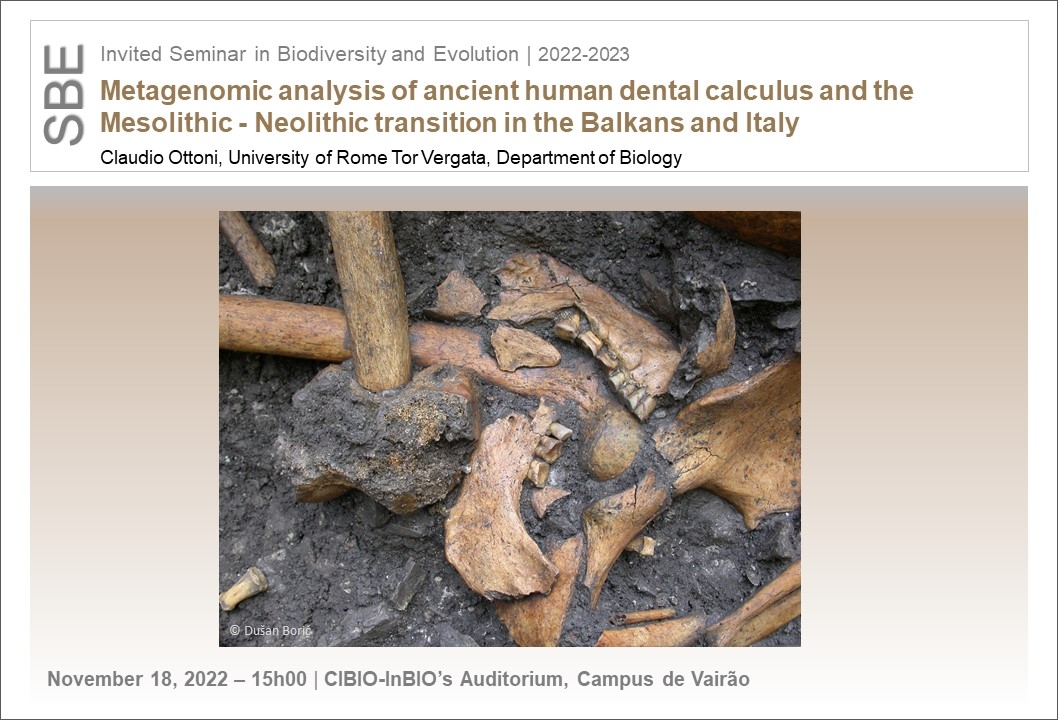Metagenomic analysis of ancient human dental calculus and the Mesolithic - Neolithic transition in the Balkans and Italy
18 Nov 2022 - Claudio Ottoni, University of Rome Tor Vergata, Department of Biology | 15h00 - CIBIO-InBIO’s Auditorium, Campus de Vairão

INVITED SEMINAR IN BIODIVERSITY AND EVOLUTION
Dental calculus, plaque mineralized on the surfaces of teeth during life, is primarily composed of calcium phosphate salts mixed with the remnants of previously viable microorganisms and a variety of plant and animal debris (e.g. starch granules, pollen grains, animal tissues and other unidentifiable organic residues). As the deposition of tartar is continuous throughout the life and ceases upon the death of an individual, dental calculus represents a unique source of human biographic information. Recently, it has been demonstrated that shotgun metagenomics (the untargeted sequencing of all DNA content of a given sample) of ancient dental calculus is a thriving source for characterizing the oral microbiome of extinct hominins (Neanderthal) and ancient humans. Ancient DNA preserved within the mineral matrix of dental calculus constitutes a track record of dietary behaviour and health status of ancient individuals.
Here, I present the reconstruction of oral microbiomes via shotgun metagenomics of dental calculus in 44 ancient foragers and farmers from two regions playing a pivotal role in the spread of farming across Europe, the Balkans and the Italian Peninsula. We reconstructed the impact of the spread of farming in the human oral environment and illustrate that major taxonomic shifts in oral microbiome composition occurred after the Neolithic. Furthermore, we show that the functional profile of modern humans evolved in recent times to develop peculiar mechanisms of antibiotic resistance that were previously absent.
I am a paleogeneticist and I obtained my doctoral degree in Ecology and Evolutionary Biology in 2008, at the University of Rome Tor Vergata (Italy). My research interests focus on biomolecular archaeology and the study of ancient DNA as a tool to reconstruct the past of human and animal populations. In particular, by combining genetic information and multiple archaeological and biomolecular data, I investigate animal domestication and ancient microorganisms (oral microbiomes from calculus samples and zoonotic pathogens). I was post-doctoral research assistant at the Center for Archaeological Sciences of the KU Leuven University (2009-2016), the Center for Ecology and Evolutionary Synthesis of the University of Oslo (2016-2018), and the Diet and Ancient Technology Laboratory of Sapienza University of Rome (2018-2021). Since April 2021 I am associate professor at the Department of Biology of the University of Rome Tor Vergata, where I am Principal Investigator of the ERC-CoG project FELIX, aimed at investigating the process of cat domestication through ancient DNA and stable isotope analysis.
[Host: Catarina Ginja, Archaeogenetics - ARCHGEN]